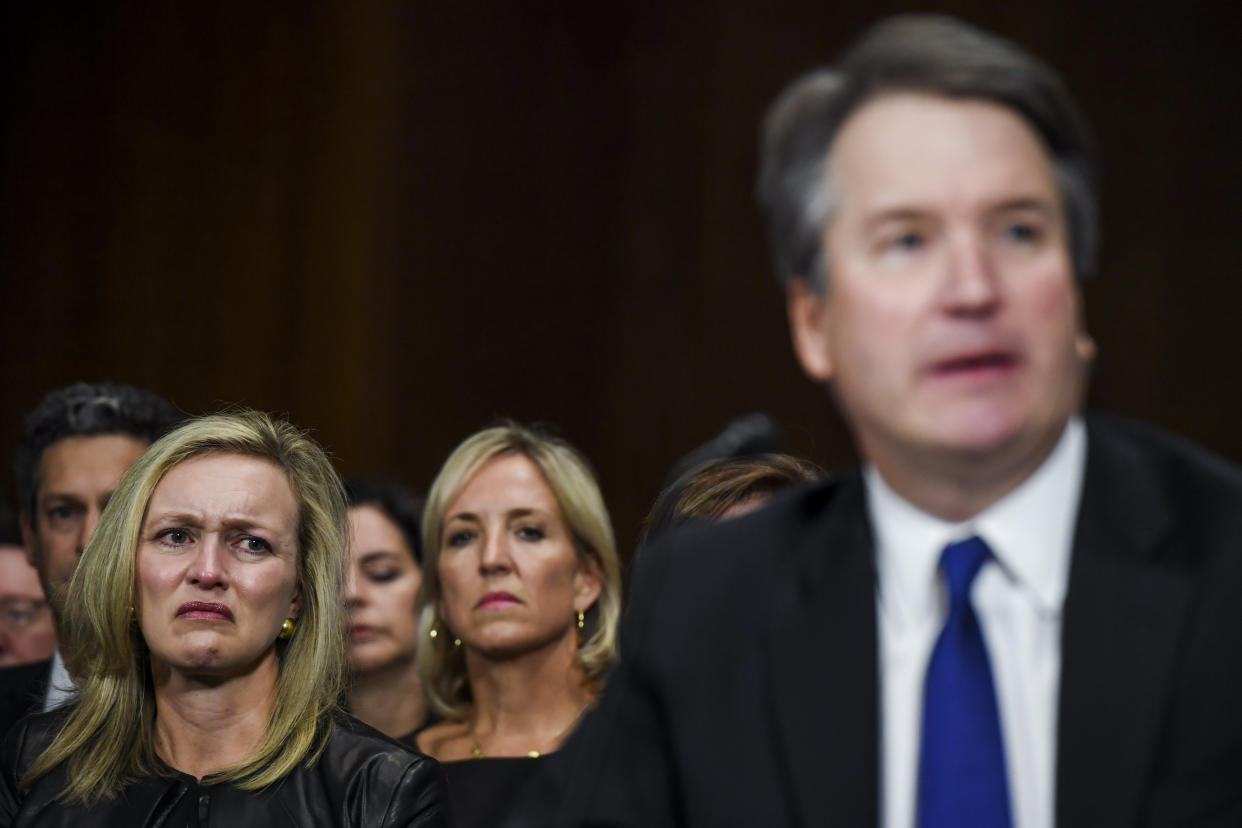Opinion: Women Are Not Your Shield, Judge Kavanaugh

Brett Kavanaugh showed up to his Supreme Court nomination hearing Thursday wearing a dark business suit and an additional, invisible suit of armor made up of all the women he’s ever known in his life.
In his opening statement, made after professor Christine Blasey Ford testified that she “100 percent” believes that Kavanaugh sexually assaulted her when they were both in high school in the early 1980s, the federal judge spoke (and yelled) about all the women he’s known since he was a teenager who would vouch for his character. One was one of his “closest friends to this day” who confided in him that she was a sexual abuse survivor, another his mother. He mentioned his wife, talked about his daughters. At one point, he literally listed women he’s known: “Amy or Julie or Kristen or Karen or Suzanne or Moira or Megan or Nikki.”
Using women as shields is a well-known tactic to refute reports of gendered harassment or violence. It’s a perverse idea, if you really consider it: If a man doesn’t harm all the women around him, how could he have ever harmed one (or three)? It’s cousin to the “I’m the son of a mother” defense and akin to “I can’t be racist, my best friend is black!”
Kavanaugh is good at using this device. He’s been doing it for a while. I keep thinking about the high school girls basketball team that Kavanaugh coaches. He mentioned them in his opening statement during the original round of hearings into his nomination for Supreme Court justice: “For the past seven years, I have coached my daughters’ basketball teams. I love coaching. All the girls I have coached are awesome.”
Two days later, on the third day of the hearings, current and former players of the girls high school basketball team that he coaches sat behind him. The New York Times described them as being “in blue sweaters, ponytails and plaid skirts.” According to the Times, “Kavanaugh introduced each of them, rattling off their names and, in a remarkable display of memory not devoted to legal precedent, their grades.” Then the room burst into applause.
There was something troubling about the parading of these girls at the time. Kavanaugh was under intense scrutiny, in part, because of the concern that, if put onto the highest bench in the land, he will rule against reproductive rights. That very day at the hearing, abortion and whether Roe v. Wade was settled law were center stage. He wanted us to believe that because he coaches these girls and is kind to them and thinks they are awesome that we shouldn’t worry that he would rule against their rights. But his judicial record and his emails suggest otherwise.
But now, a few weeks later, multiple people have come forward and told stories about how disrespectful Kavanaugh was to girls in high school and college (his high school yearbook alone is disgusting, no matter how much he tried to argue otherwise at the hearing). There have been reports about how he likes his law clerks ― which he told us Thursday were a lot of women ― to look a certain way.
I can’t help but think that, based on statistics, some of those girls in Kavanaugh’s life are already sexual assault survivors; some of them will be in their lifetime (usually by someone who knows them well). They have now participated, whether they understood it that way, in trying to clean up the past (and assure the future) of this man whom one woman says assaulted her in high school, another he made fun of in his yearbook, both to impress high school boys. They have had to listen to so many people say over the last week or so that boys assaulting girls is normal, something all boys do, and what does it really matter anyway.
And all this is because they wanted to play basketball and their coach ended up being brought under scrutiny.
But Thursday, when Kavanaugh brought them up (which, of course, he did), it wasn’t to lament about their futures or to worry over their health or safety, or refute the “boys will be boys” narrative that has been flung around without care and will likely haunt them in their school years and beyond. It was to complain that because of professor Blasey’s testimony and the reporting that has happened since her story became public, he “may never be able to coach again.” Apparently, the inconvenience to his life is worth more than the trauma women will face throughout their own lives.
Stop telling us about the women you know, the ones you have been nice to, the ones you haven’t harmed, how great a guy you are because you, unlike the rest of the world, didn’t treat some women like shit. We are not your armor. We are not your excuse. We are not your female assistants who will step in to do your dirty work when you don’t have the guts to question a sexual assault survivor yourself or when you fail to put any women from your party on the judiciary committee, ever (shame on Phoenix prosecutor Rachel Mitchell for participating Thursday).
Right at the end of the hearing, Sen. Kamala Harris (D-Calif.) asked Kavanaugh, “Do you agree that it is possible for men to both be friends with some women and treat other women badly?” Kavanaugh responded that it is and then, again, reiterated that he’s been friends with women since he was 14. He knows the deal, he just finds the invisible armor much too comfy and much too useful to let it go.
Jessica Luther is a freelance journalist, an author and a co-host of the feminist sports podcast “Burn It All Down.”
Love HuffPost? Become a founding member of HuffPost Plus today.
This article originally appeared on HuffPost.

